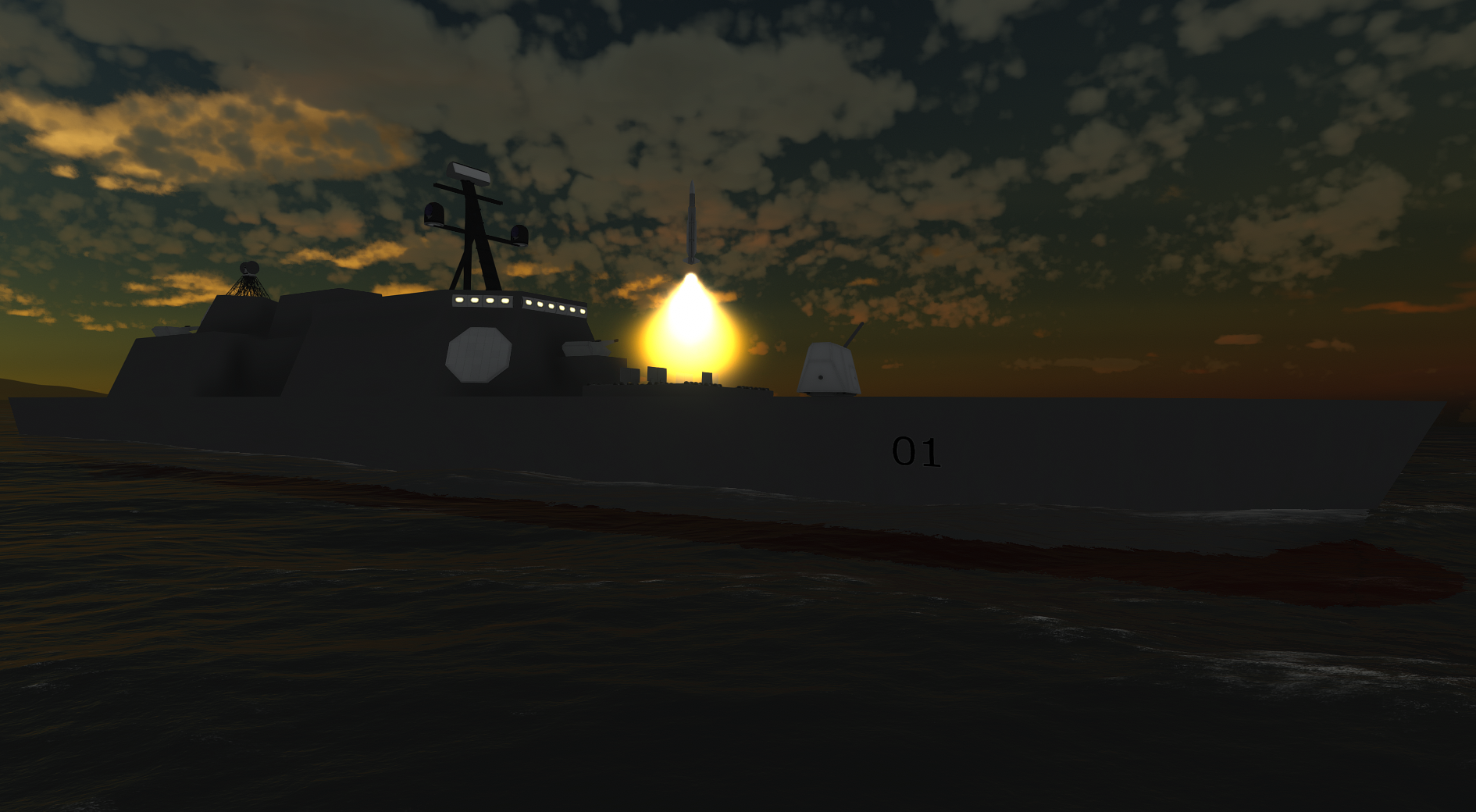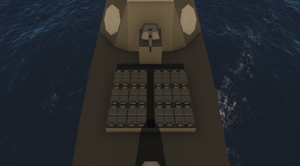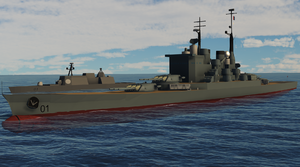Hikaze Class Destroyer: Difference between revisions
mNo edit summary |
No edit summary |
||
| Line 46: | Line 46: | ||
There were also issues that plagued the class with regards to its propulsion and power systems, which was a change present from the original contract. The original production called for two propulsion units that were powered by an NCI GT-77 Gas Turbine. The ship in that current configuration was simulated to only be able to reach about 20kn, which necessitated a redesign of the system. The issue with the power system was that one GT-77 Gas Turbine could not feasibly power the Type 78N ID-FCRS and the Type 81 Sonar, so this also required redesigns. The new system had introduced a third propulsion unit which enabled the ship to reach a maximum speed of 29-30kn, whilst a second GT-77 was introduced to offset the power costs. |
There were also issues that plagued the class with regards to its propulsion and power systems, which was a change present from the original contract. The original production called for two propulsion units that were powered by an NCI GT-77 Gas Turbine. The ship in that current configuration was simulated to only be able to reach about 20kn, which necessitated a redesign of the system. The issue with the power system was that one GT-77 Gas Turbine could not feasibly power the Type 78N ID-FCRS and the Type 81 Sonar, so this also required redesigns. The new system had introduced a third propulsion unit which enabled the ship to reach a maximum speed of 29-30kn, whilst a second GT-77 was introduced to offset the power costs. |
||
| − | The VLS system was also riddled with issues regarding missile clearance, which required a slight modification to ''Hikaze'' and ''Narikaze'' following the information gained from ''Hikaze'' during her commissioning. The problems with the original system caused missiles to have problems launching, with one instance almost causing a detonation in the VLS bay. The missile only had a simulated warhead which prevented the potential loss of the entire ship. These problems placed a strain on the program, and affected the Naval Ordinance Bureau's opinion of the ship class as a whole, as the first two ships of the class had to be partially redesigned to include a new VLS bay. |
+ | The VLS system was also riddled with issues regarding missile clearance, which required a slight modification to ''Hikaze'' and ''Narikaze'' following the information gained from ''Hikaze'' during her commissioning. The problems with the original system caused missiles to have problems launching, with one instance almost causing a detonation in the VLS bay. The missile only had a simulated warhead which prevented the potential loss of the entire ship. These problems placed a strain on the program, and affected the Naval Ordinance Bureau's opinion of the ship class as a whole, as the first two ships of the class had to be partially redesigned to include a new VLS bay. |
| − | Between the technical troubles and massive cost spike of the program itself, the Naval Ordinance Bureau made the decision to reduce the order size from eight ships originally down to five ships, with the fifth hull on the verge of being cancelled entirely. |
+ | Between the technical troubles and massive cost spike of the program itself, the Naval Ordinance Bureau made the decision to reduce the order size from eight ships originally down to five ships, with the fifth hull on the verge of being cancelled entirely. However, these issues were only really present in the original Flight I variants, with the first two ships of the class being refitted to Flight IA status alleviating most of the issues previously present. ''RZS Narikaze'' and ''RZS Harukaze'' are both part of the Flight II program, which has removed many of the teething issues that the class originally experienced. The information gained about the ''Hikaze Class'' Flight II from the ongoing commissioning of ''Narikaze'' has brought some faith back in the class. |
==Service History== |
==Service History== |
||
| − | [[File:Zalkent DDG-01+BBG-01.png|left|thumb|''RZS Hikaze'' alongside |
+ | [[File:Zalkent DDG-01+BBG-01.png|left|thumb|''RZS Hikaze'' alongside interim 1st Fleet Flagship ''RZS Allondria''.]] |
The first ship of the class, ''RZS Hikaze DDG-01'' was commissioned on June 12th, 2199 and the second ship, ''RZS Narikaze DDG-02'' being commissioned on December 19th, 2199 as part of the New Navy Program (NNP). ''RZS Harukaze DDG-03'' is expected to commission in January or February of 2200, with ''RZS Mizukaze DDG-04'' being expected to finish construction around the time that ''Harukaze'' is finished with commissioning. The fifth ship of the class, designated hull number ''DDG-05'', is currently unnamed and planned to be laid down sometime in 2200, with construction finishing in 2201 or 2202. However, ''DDG-05'' is on the verge of cancellation due to budgetary concerns. These five ships are expected to primarily serve the role of Air-Defense Escort for the flagship [[Valkyrie Class Supercarrier|''RZS Masahiro Ashigaru'']] in the ''[[Zalkentian Navy|Zalkentian 1st Fleet]]'', but they have Anti-Ship and Shore Bombardment capabilities built in as part of their Multi-Mission profile. |
The first ship of the class, ''RZS Hikaze DDG-01'' was commissioned on June 12th, 2199 and the second ship, ''RZS Narikaze DDG-02'' being commissioned on December 19th, 2199 as part of the New Navy Program (NNP). ''RZS Harukaze DDG-03'' is expected to commission in January or February of 2200, with ''RZS Mizukaze DDG-04'' being expected to finish construction around the time that ''Harukaze'' is finished with commissioning. The fifth ship of the class, designated hull number ''DDG-05'', is currently unnamed and planned to be laid down sometime in 2200, with construction finishing in 2201 or 2202. However, ''DDG-05'' is on the verge of cancellation due to budgetary concerns. These five ships are expected to primarily serve the role of Air-Defense Escort for the flagship [[Valkyrie Class Supercarrier|''RZS Masahiro Ashigaru'']] in the ''[[Zalkentian Navy|Zalkentian 1st Fleet]]'', but they have Anti-Ship and Shore Bombardment capabilities built in as part of their Multi-Mission profile. |
||
| + | |||
| + | Currently, ''RZS Hikaze'' and ''RZS Narikaze'' have served as escorts for the interim 1st Fleet Flagship, Battleship ''[[Morser Class Battleship|RZS Allondria]]'', during her voyage to the [[Confederacy of Atreus]] in order to bring the 1st Fleet Admiral to the ''RZS Masahiro Ashigaru'', which is currently under construction. |
||
==Ships== |
==Ships== |
||
Revision as of 23:21, 10 June 2024
The Hikaze ("Wind of Light" - Fuyurikan: 光風) class is a type of Guided Missile Destroyer developed in Zalkent to be fielded in the Royal Zalkentian Navy for multi-mission profiles.
|
Hikaze Class
Prj. 2184 "Hikaze" Large Multi-Mission Guided Missile Destroyer
|
|||||
|---|---|---|---|---|---|
| Ship | |||||
 |
|||||
| RZS Hikaze DDG-01 testing its Anti-Air Systems c. 2199 | |||||
| Role | Multi-Mission Guided Missile Destroyer | ||||
| National Origin | Zalkent | ||||
| Production History | |||||
| Designed | |||||
| 2184 - 2190 | |||||
| Produced | |||||
| 2197 - N/A | |||||
| Designer | Narinō Combined Industries | ||||
| Unit Cost | 232,713 - Unarmed(√) | ||||
| Number Built | 4 | ||||
| Service History | |||||
| In Service | |||||
| 2199 - N/A | |||||
| Used By | Zalkent | ||||
| Vessel Characteristics | |||||
| Displacement | 1,190 tons | ||||
| Length | 119.3 m | ||||
| Beam | 19.7 m | ||||
| Height | 25.6 m | ||||
| Propulsion | 3 NCI Electric Naval Propulsion Units 2 NCI GT-77 Gas Turbine |
||||
| Operational Range | N/A km | ||||
| Complement | 178 | ||||
| Sensors and Processing Systems | TEB ARC Type 78N ID-FCRS Type 81 Sonar System |
||||
| Armament | 48 VLS Cells 1 5"/127mm Mod 4 Naval Gun 3 Oerlikon Millennium Cannons 2 250MW Type 99 Directed Energy Weapons |
||||
| Aircraft Carried | 1 Rotary Wing Aircraft | ||||
Development
With the establishment of the Royal Zalkentian Navy in 2182, the Naval Ordinance Bureau commissioned NCI to develop a Multirole Guided Missile Escort. Designated internally as "Project 2184 Missile Cruiser", but due to fears within certain factions of the General Assembly that there would be retribution for fielding an advanced capital ship, and considering the paranoia from the Burr War and Civil War, the project was later renamed to "Project 2184 Large Multi-Mission Guided Missile Destroyer" as a result. The development was faced with numerous technical issues due to this being the first ship indigenously developed in Zalkent since the Burr War. Multiple parties outside the government have argued that the ship should be classified as a Guided Missile Cruiser, but the government remained firm on the decision to prevent the ship class from being labelled as a Guided Missile Cruiser.
The systems that make up the ship were subcontracted out to multiple technology and weapons firms across Zalkent, with the Type 78 Integrated Detection and Fire Control Radar System (ID-FCRS) and the Type 81 Sonar System being chosen for the vessels. The propulsion systems were manufactured in house by NHI. As for the weapons systems, they were chosen by the Naval Ordinance Bureau itself, as they fit the requirements for the profile of the class. The ship also integrated the Tenrai Electronics Bureau (TEB) produced Advanced Resource Computer for Crew Reduction, abbreviated as ARC or ARCCR. The ARC system utilizes multiple computer systems to monitor the nature of the ship's systems, providing detailed diagnostics to the crew which was a necessity due to the size of the Royal Zalkentian Navy.
Design
The design of the Hikaze was based on observations of foreign naval fleets and the necessity for an escort type ship within the newly formed Royal Zalkentian Navy. The Hikaze Class was the first time that the Type 78 ID-FCRS saw naval deployment, which was previously only used on land based Anti-Air emplacements. This proved the capabilities of the system for future ship classes, but the early arrays had issues with corrosion from the ocean waters. This led to the refitting of the lead ship with the Type 78N ID-FCRS arrays, which were reinforced to deal with the corrosive properties of salt water. The array failures were the reasoning behind the delayed commissioning of RZS Hikaze. There were also issues present with the supplied ARC System configurations, but these were minor problems that were updated during the integration of the Type 78N variant of the ID-FCRS.
There were also issues that plagued the class with regards to its propulsion and power systems, which was a change present from the original contract. The original production called for two propulsion units that were powered by an NCI GT-77 Gas Turbine. The ship in that current configuration was simulated to only be able to reach about 20kn, which necessitated a redesign of the system. The issue with the power system was that one GT-77 Gas Turbine could not feasibly power the Type 78N ID-FCRS and the Type 81 Sonar, so this also required redesigns. The new system had introduced a third propulsion unit which enabled the ship to reach a maximum speed of 29-30kn, whilst a second GT-77 was introduced to offset the power costs.
The VLS system was also riddled with issues regarding missile clearance, which required a slight modification to Hikaze and Narikaze following the information gained from Hikaze during her commissioning. The problems with the original system caused missiles to have problems launching, with one instance almost causing a detonation in the VLS bay. The missile only had a simulated warhead which prevented the potential loss of the entire ship. These problems placed a strain on the program, and affected the Naval Ordinance Bureau's opinion of the ship class as a whole, as the first two ships of the class had to be partially redesigned to include a new VLS bay.
Between the technical troubles and massive cost spike of the program itself, the Naval Ordinance Bureau made the decision to reduce the order size from eight ships originally down to five ships, with the fifth hull on the verge of being cancelled entirely. However, these issues were only really present in the original Flight I variants, with the first two ships of the class being refitted to Flight IA status alleviating most of the issues previously present. RZS Narikaze and RZS Harukaze are both part of the Flight II program, which has removed many of the teething issues that the class originally experienced. The information gained about the Hikaze Class Flight II from the ongoing commissioning of Narikaze has brought some faith back in the class.
Service History
The first ship of the class, RZS Hikaze DDG-01 was commissioned on June 12th, 2199 and the second ship, RZS Narikaze DDG-02 being commissioned on December 19th, 2199 as part of the New Navy Program (NNP). RZS Harukaze DDG-03 is expected to commission in January or February of 2200, with RZS Mizukaze DDG-04 being expected to finish construction around the time that Harukaze is finished with commissioning. The fifth ship of the class, designated hull number DDG-05, is currently unnamed and planned to be laid down sometime in 2200, with construction finishing in 2201 or 2202. However, DDG-05 is on the verge of cancellation due to budgetary concerns. These five ships are expected to primarily serve the role of Air-Defense Escort for the flagship RZS Masahiro Ashigaru in the Zalkentian 1st Fleet, but they have Anti-Ship and Shore Bombardment capabilities built in as part of their Multi-Mission profile.
Currently, RZS Hikaze and RZS Narikaze have served as escorts for the interim 1st Fleet Flagship, Battleship RZS Allondria, during her voyage to the Confederacy of Atreus in order to bring the 1st Fleet Admiral to the RZS Masahiro Ashigaru, which is currently under construction.
Ships
| Name | Laid Down | Launched | Commissioned | Fate | Operator |
|---|---|---|---|---|---|
| RZS Hikaze | March 17th, 2197 | November 21st, 2198 | June 12th, 2199 | Active | Royal Zalkentian Navy |
| RZS Narikaze | April 11th, 2198 | July 1st, 2199 | December 19th, 2199 | Active | Royal Zalkentian Navy |
| RZS Harukaze | September 29th, 2198 | November 15th, 2199 | N/A | Commissioning | Royal Zalkentian Navy |
| RZS Mizukaze | June 9th, 2199 | N/A | N/A | Pending Completion | Royal Zalkentian Navy |
| Unnamed Hull DDG-05 | N/A | N/A | N/A | Planned | Royal Zalkentian Navy |
| Unnamed Hull DDG-06 | N/A | N/A | N/A | Cancelled | Royal Zalkentian Navy |
| Unnamed Hull DDG-07 | N/A | N/A | N/A | Cancelled | Royal Zalkentian Navy |
| Unnamed Hull DDG-08 | N/A | N/A | N/A | Cancelled | Royal Zalkentian Navy |


